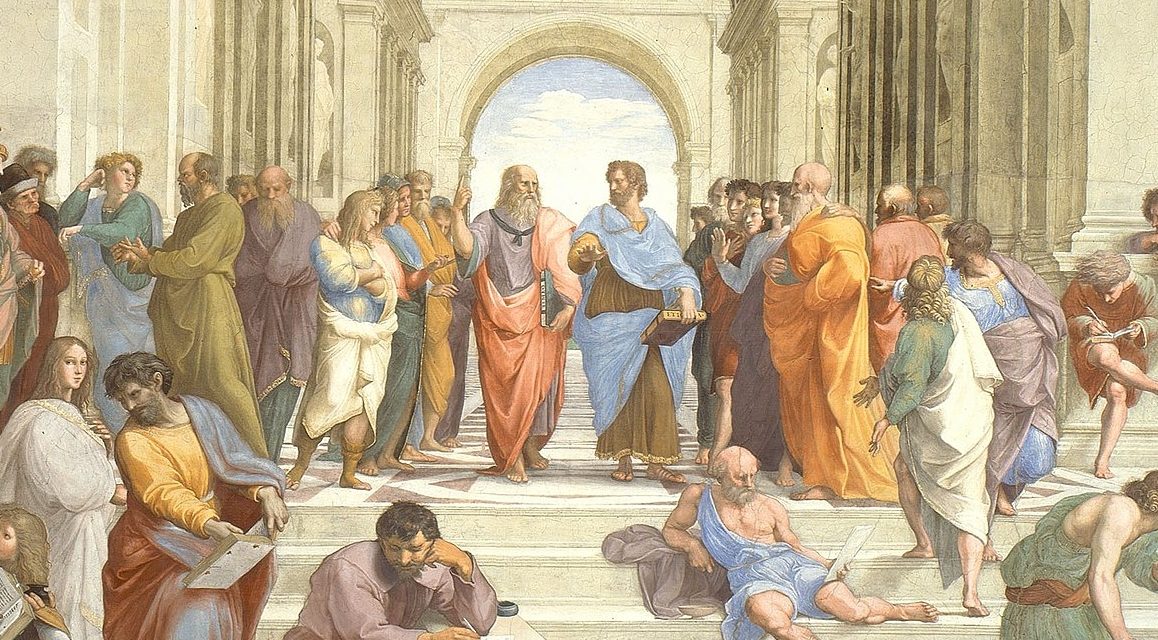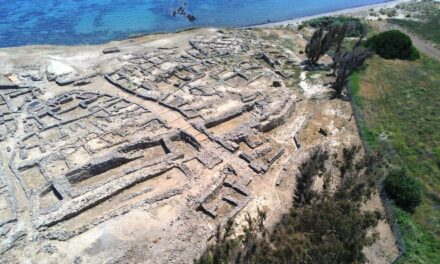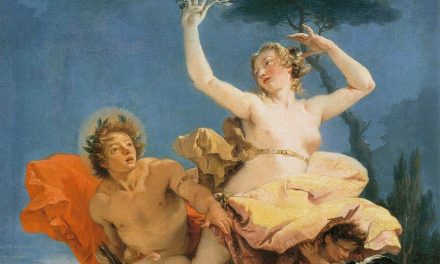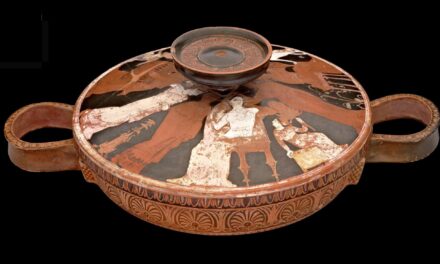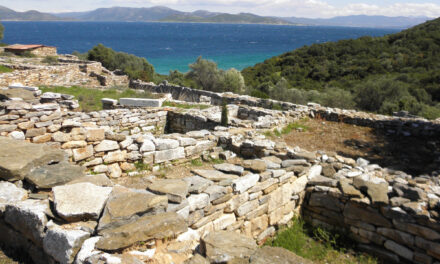When citing Greece’s contributions to world culture -from democracy to theatre and athletics- philosophy is one of the first that come to mind. Unsurprisingly, its name is Greek, from philosophia meaning “love of wisdom”.
Unlike other practices and bodies of knowledge, such as architecture and visual arts, which were perfected but not invented by Greeks, Greece is believed to be the birthplace of Western philosophy, in that the notion of philosophy as the study of the basic axioms that comprise knowledge was actually created there.
There are of course older philosophical systems in the world, such as the Hindu Samkhya tradition, but they are generally believed to have developed independently, and there is no substantial historical evidence of contacts and exchanges between these cultures -until the times of Alexander the Great- that would suggest an influence of one over the other. Similarities between Hindu and early Greek thought are therefore generally considered incidental.
When thinking about Greek philosophy, certain names inevitably crop up. Figures like Socrates, Plato and Aristotle -each a disciple of the former- are held to universal acclaim and may often be referred to even by people completely unfamiliar with the study of philosophy. In this article, you can find a small list of important thinkers and philosophers of Greek origin you may not have heard about.
This list includes not only ancient Greek philosophers, but also several prominent thinkers of the Byzantine era and Modern times. They are anything but obscure within the sphere of philosophy and academia, but anyone not specialised in these fields is very likely to never have heard of them or at least know much of their actual contributions.
We begin with the pre-Socratics, the philosophers that either preceded Socrates, or were his contemporaries but developed completely independent schools of thought with no influence from him. All the philosophers that followed Socrates, Plato and Aristotle were to some extent influenced by some or all of them, even if only by their differences.
PRE-SOCRATIC
Thales
Thales of Miletus (c. 624 – c. 546 BC) was regarded as the first philosopher by Aristotle, and reckoned among the Seven Sages of Greece. He is recognised as the first known person to have turned away from mythological explanations, trying instead to interpret natural phenomena through naturalistic theories and hypotheses, in a precursor to modern science. He thus charted the course for all the other pre-Socratic philosophers. According to Aristotle, Thales’ cosmological thesis was that the originating principle of nature was a single material substance: water.
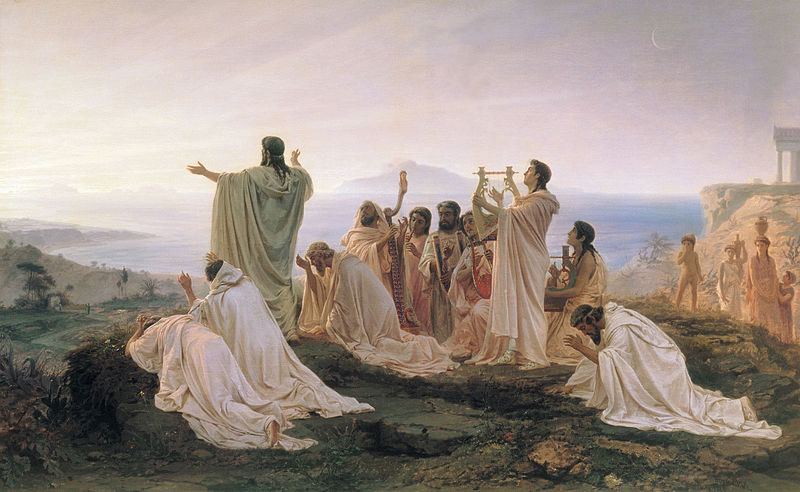 Pythagoreans celebrate sunrise, 1869, Fyodor Bronnikov (via Wikimedia Commons)
Pythagoreans celebrate sunrise, 1869, Fyodor Bronnikov (via Wikimedia Commons)
Pythagoras
Pythagoras of Samos (c. 570 – c. 495 BC), is mostly famous nowadays for developing the eponymous theorem, one of the basic rules of geometry. Hence, many might think of him solely as a mathematician. Yet, at his time, science and philosophy were closely intertwined. He is credited with scientific discoveries including Pythagorean tuning, the five regular solids and the Theory of Proportions, while he was also among those said to have originated the idea of Earth’s sphericity.
Around 530 BC he travelled to the Greek colony of Croton in southern Italy, where he founded a “school“, functioning mostly as a commune or sect. Adherents were bound by a vow to Pythagoras and each other, shared all their possessions among them, practiced vegetarianism and lived ascetic lives dedicated to the study of religious and philosophical theories. One of Pythagorianism’s main doctrines appears to have been metempsychosis, and another one was of the “harmony of the spheres“, which maintained that the planets and stars move according to mathematical equations, which correspond to musical notes and thus produce an inaudible symphony.
Heraclitus
Heraclitus of Ephesus (c. 535 – c. 475 BC) propounded a distinctive theory which he expressed in oracular language. He is best known for his doctrines that things are constantly changing, that opposites coincide, and that fire is the basic material of the world. He is credited with the phrase panta rhei (“everything flows”) and philosophy has been summed up with the adage “no man ever steps in the same river twice” (a phrase that he didn’t explicitly utter, although he often used the river as a metaphor).
Parmenides
Parmenides of Elea (early 5th BC) is said to have composed one single work, a metaphysical and cosmological poem, which has come to be known under the title “On Nature”. He is generally recognised as having played a major role in the development of ancient Greek natural philosophy and metaphysics, was among the first to propose an ontological characterisation of the fundamental nature of reality. He is credited with the phrase “For to be aware and to be are the same” and with the dictum “Nothing comes from nothing“. His adage “whatever is is, and what is not cannot be” has been contrasted with Heraclitus’ concept of constant change.
Anaxagoras
Anaxagoras (c. 500 – c. 428 BC) propounded a physical theory of “everything-in-everything”, and claimed that nous (intellect or mind) was the motive cause of the cosmos. Responding to the claims of Parmenides on the impossibility of change, Anaxagoras described the world as a mixture of primary imperishable ingredients, where material variation was never caused by an absolute presence of a particular ingredient, but rather by its relative preponderance over the other ingredients. He also gave a number of novel scientific accounts of natural phenomena; he was the first to give a correct explanation of eclipses, and described the Sun and stars as a fiery masses.
Empedocles
Empedocles (c. 494 – c. 434 BC) is primarily known for pioneering the influential four-part theory of roots (air, water, earth, and fire) along with two active principles of Love and Strife, which influenced later philosophy, medicine, mysticism, cosmology, and religion. The philosophical system responded to Parmenides’ rejection of change while embracing religious injunctions and magical practices. Influenced by Pythagoras, he developed his own theory on reincarnation; he is also credited with the first comprehensive theory of light and vision.
Protagoras
Protagoras (c. 490 – c. 420 BC) was one of the most important sophists and exerted considerable influence in fifth-century intellectual debates. His teaching had a practical and concrete goal, and was mainly devoted to the development of argumentative techniques. He addressed subjects connected to virtue and political life, and especially was involved in the question of whether virtue could be taught. He is famous for his statement that “man is the measure of all things”, interpreted by Plato to mean that there is no objective truth.
Democritus
Democritus (c. 460 – c. 370 BC) known in antiquity as the “laughing philosopher” because of his emphasis on the value of “cheerfulness“, was one of the two founders of ancient atomist theory. He elaborated a system originated by his teacher Leucippus into a materialist account of the natural world. Many consider Democritus to be the “father of modern science”, and Greece’s National Centre for Scientific Research is named after him. Later Greek historians consider Democritus to have established aesthetics as a subject of investigation and study, as he wrote theoretically on poetry and fine art long before authors such as Aristotle.
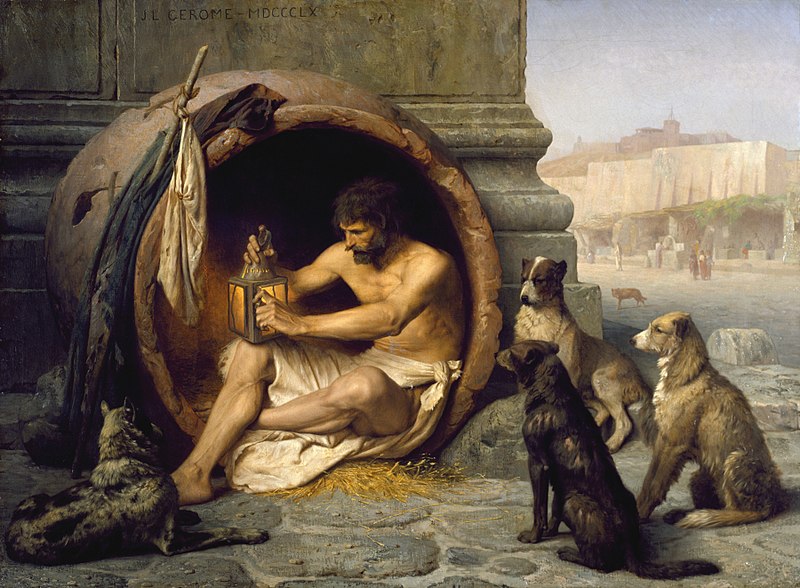 Diogenes, 1860, Jean-Léon Gérôme (via Wikimedia Commons)
Diogenes, 1860, Jean-Léon Gérôme (via Wikimedia Commons)
CLASSICAL
Diogenes
Diogenes of Sinope (c. 412/404 – c. 323 BC) was one of the founders -and most famous proponent- of Cynicism, a school of thought first outlined by was Antisthenes, one of Socrates’ pupils. Arriving in Athens, Diogenes developed great admiration for Antisthenes’ ascetic lifestyle and teachings. He became his disciple, viewing him -and not Plato- as the true heir to Socrates. He was an advocate of nature over convention, and was famous for living in a wine jar and going about with a lantern looking for “a man” – i.e., someone not corrupted. According to another famous anecdote (a subject of many artistic works over the centuries), Alexander the Great met the philosopher in Corinth. When, standing before him in awe, the young king asked if there was any favour he might do for him, Diogenes replied “Yes. Get out of my sunlight”.
Aristippus
Aristippus of Cyrene (c. 435 – c. 356 BC) the founder of the Cyrenaic school of hedonism (from hedone “pleasure”), the ethic of pleasure. A pupil of Socrates, he distanced himself from his master’s teachings, and posited the belief that among human values pleasure is the highest and pain the lowest. He warned his students to avoid inflicting as well as suffering pain, and maintained the superiority of physical pleasures over intellectual ones. Aristippus believed that people should dedicate their lives to the pursuit of pleasure, but also that they should use good judgment and exercise self-control to temper powerful human desires. He was the first of Socrates’ disciples to demand a salary for teaching philosophy.
Epicurus
Epicurus (341 – 270 BC) was the founder of a highly influential philosophical movement named after him. He rejected Plato’s teaching and established his own school in Athens, called “the Garden”. Influenced by thinkers such as Democritus, he believed in atomic materialism, dismissing the idea of an afterlife, as well as of divine punishment and supernatural intervention. According to Epicureanism, the purpose of philosophy was to help people attain a happy, tranquil life characterised by ataraxia (peace and freedom from fear) and aponia (the absence of pain).
Epicurus also placed an extremely high value on friendship, emphasising unequivocal loyalty to friends as the only way to maximise one’s security and, thus, felicity. His teachings differed from Cyrenaic hedonism because he emphasised the superiority of mental pleasures, and prioritised calmness and the avoidance of pain over the active pursuit of pleasures and luxuries. His most famous adage is lathe biōsas “live in obscurity”, meaning that an ideal life is a peaceful one, where one does not attract too much attention by acquiring excessive wealth or power or pursuing a career in politics.
HELLENISTIC & ROMAN
Zeno
Zeno of Citium (c. 334 – c. 262 BC [not to be confused with the pre-Socratic Zeno of Elea]) was the founder of the Stoic school of philosophy. Based on the moral ideas of the Cynics, Stoicism (named after the porch [stoa poikilê] in the Agora at Athens, where the members of the school congregated) laid great emphasis on goodness and peace of mind gained from living a life of Virtue in accordance with Nature. Its followers believed that emotions like fear, envy, but also passionate love and desire arose from false judgments, and that the sage -a person who had attained moral and intellectual perfection- would not undergo them.
Origen
Origen of Alexandria (185 – 254) was a Christian exegete and theologian, who made copious use of the allegorical method in his commentaries, and (though later considered a heretic) laid the foundations of philosophical theology for the church. He wrote about 2,000 treatises in multiple branches of theology and was one of the most influential figures in early Christian theology, apologetics, and asceticism. Origen was the first Christian to speak of three “hypostases” in the Trinity and to use the term homoousios (though only by analogy) of the relation between the Father and the Son. He has been described as “the greatest genius the early church ever produced”.
Plotinus
Plotinus (204/5 – 270) is generally regarded as the founder of what has come to be known as Neoplatonism. Although he was born in Roman Egypt, and his ancestry is uncertain, he is recognised as a Greek philosopher, since he wrote in Greek and was an illustrious continuator of Plato. He was also influenced by the teachings of Persian and Indian philosophy and Egyptian theology. The three basic principles of Plotinus’ metaphysics, described in the Enneads, are called by him “the One”, the Intellect, and the Soul; these principles are both ultimate ontological realities and explanatory principles. The supreme, totally transcendent and indivisible “One” was identified with the concept of ‘Good’ and the principle of ‘Beauty’.
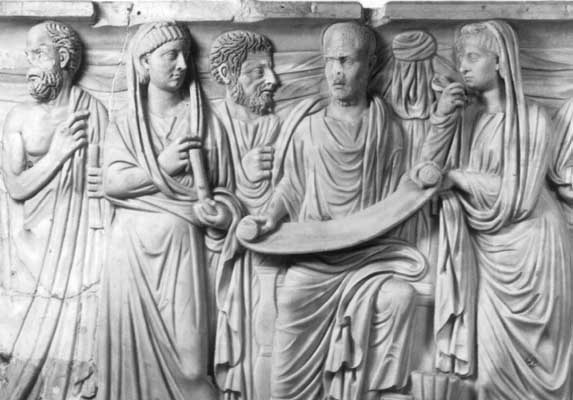 Sarcophagus identified as depicting Plotinus with his disciples (Wikimedia Commons)
Sarcophagus identified as depicting Plotinus with his disciples (Wikimedia Commons)
BYZANTINE
Stephanus of Alexandria
Stephanus of Alexandria (late 6th /early 7th century) was a Byzantine philosopher and teacher who, besides philosophy in the Neoplatonic tradition, also wrote on alchemy, astrology and astronomy. He was involved in the controversy over Monophysitism, apparently taking positions on both sides. Many works are attributed to Stephanus, some falsely, and he has been identified by some as the same person as the philosopher Stephanus of Athens.
Michael Psellos
Michael Psellos (c. 1017 – c. 1078/1096) was a Byzantine philosopher, theologian, and statesman whose advocacy of Platonic philosophy as ideally integrable with Christian doctrine initiated a renewal of Byzantine classical learning that later influenced the Italian Renaissance. Psellos made lasting contributions to Byzantine culture, including the reform of the university curriculum to emphasise the Greek classics, and Platonist thought, he interpreted as precursory to Christian revelation.
Gregory Palamas
Gregory Palamas (c. 1296 – 1357/1359) was Gregory Palamas a monk on Mount Athos and later archbishop of Thessaloniki, who was canonised in 1368. He was a renowned theologian and intellectual leader of Hesychasm, an ascetical method of mystical prayer that integrates repetitive prayer formulas with bodily postures and controlled breathing. He is also famous for his defense of the uncreated character of the light of the Transfiguration, and the distinction between God’s essence and energies. His theological contributions are sometimes referred to as Palamism, and his followers as Palamites.
Gemistus Plethon
George Gemistus (called Plethon, c. 1355/1360 – 1452/1454) was one of the most renowned philosophers of the late Byzantine era. He was a chief pioneer of the revival of Greek scholarship in Western Europe. He rekindled the Western humanists’ interest in Plato when he delivered his treatise “On the Difference Between Aristotle and Plato” during the 1438–1439 Council of Florence. Plethon also introduced the Geography of Strabo to the West (where it had hitherto been unknown) and led the way to the overthrow of Ptolemy’s erroneous geographical theories. As revealed in his last literary work, the Nomoi or Book of Laws, which he only circulated among close friends, he rejected Christianity in favour of a return to the worship of the classical Hellenic Gods, in a merging of Stoic philosophy and Zoroastrian mysticism.
MODERN
Theophilos Kairis
Theophilos Kairis (1784 – 1853) was a priest, philosopher and one of the leading intellectuals of the Greek Revolution. He had studied theology, mathematics, natural sciences and philosophy, and shared to the ideas of the Age of Enlightenment. He established the Orphanotropheio (“Orphanage”), a progressive school that embraced the modern university system. Kairis, along with a few disciples, founded Theosebism, a pietistic revivalist movement -inspired by the French revolutionary cults, radical Protestantism and deism- anathematised by the Synod of the Patriarchate of Constantinople. Viewed as a heretic, he was defrocked and sentenced to confinement, exile and imprisonment.
Cornelius Castoriadis
Cornelius Castoriadis (1922 –1997) was a Greek-French philosopher, social critic, economist, psychoanalyst, author of The Imaginary Institution of Society, and co-founder of the Socialisme ou Barbarie group. He was influenced by his understanding and criticism of traditional philosophical figures such as the Ancient Greeks, German Idealists, Marx, and Heidegger. He authored over twenty major works and numerous articles spanning many traditional philosophical subjects, including politics, economics, psychology, anthropology, and ontology. His oeuvre can be understood broadly as a reflection on the concept of creativity and its implications in various fields. Perhaps most importantly he warned of the dangerous political and ethical consequences of a contemporary world that has lost sight of autonomy, i.e. of the need to set limits or laws for oneself.
Sources: Stanford Encyclopedia of Philosophy; Encyclopedia Britannica; The Internet Encyclopedia of Philosophy; Wikipedia
Read also via Greek News Agenda: A Tribute to Socrates; Cornelius Castoriadis, thinker of autonomy; Education Otherwise: Τhe School of Athens heritage; Lesbos – An island of culture and history; The fascinating history of the island of Samos
N.M. (Intro image: School of Athens [detail], 1511, Raphael (via Wikimedia Commons)
TAGS: HISTORY | MODERN GREEK STUDIES

